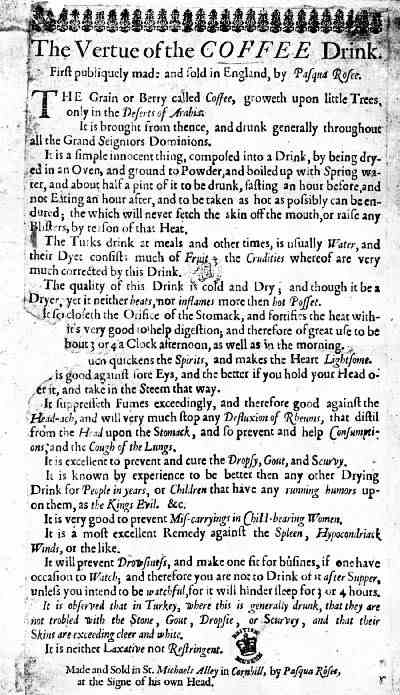If you are a coffee lover, you might be interested to know who was the first person to introduce this popular drink to London and possibly Britain. His name was Pasqua Rosée, and he was a 17th-century servant who opened the first coffee-house in London in 1652. Here is his remarkable story.
Pasqua Rosée was born in the early 1600s into the ethnic Greek community of the Republic of Ragusa, now southernmost Croatia. He is variously described as Greek, Armenian, Turkish or of Greek or Turkish origin. He spoke at least three languages: Greek, Turkish and English. He moved to Smyrna, now İzmir in Turkey, where he became the servant of Daniel Edwards, an English merchant of the Levant Company. The Levant Company was an English chartered company that regulated English trade with the Ottoman Empire and the Levant.
 |
| The Vertue of the Coffee Drink, published by Rosée in 1652 |
Rosée's language skills made him an important aid for Edwards in business and personal matters. He acted as a clerk, a translator, a social diplomat and a valet. He also prepared and served Edwards's daily coffee, a drink that was popular in the Ottoman Empire but unknown in England at that time.
In late 1651, Edwards returned to London, taking Rosée with him. He also brought along some coffee beans and a coffee pot. Edwards soon found that his friends were eager to try this exotic beverage and visit him often to drink coffee with him. This disrupted his social life and business, so he decided to set up Rosée as the proprietor of a coffee-house near the Royal Exchange. Rosée was not a freeman of the City of London, which meant he could not trade legally. To solve this problem, Edwards made his father-in-law's former apprentice, Christopher "Kitt" Bowman, a freeman of the City, join Rosée as a partner. Bowman also helped Rosée with his English and taught him how to deal with customers.
Rosée's coffee-house was a success. He sold coffee for a penny a dish and offered free access to newspapers and pamphlets. He also published a pamphlet titled The Vertue of the Coffee Drink, in which he praised the health benefits and social virtues of coffee. He claimed that coffee could cure headaches, gout, scurvy, dropsy and many other diseases. He also argued that coffee could prevent drunkenness, promote sobriety, civility and intelligence.
 |
| Plan of London in 1748 showing the position of Rosée's coffee shop, in red, in St Michael's Alley |
Rosée's coffee-house attracted many customers from different walks of life. Merchants, lawyers, doctors, scholars, politicians and writers came to drink coffee and exchange news, opinions and ideas. Rosée's coffee-house became a place for social interaction, intellectual debate and cultural exchange. It also sparked a craze for coffee among Londoners.
The last known reference to Rosée was in 1658, when he was still running his coffee-house with Bowman. After that, he disappeared from history. There are stories that he left London because of a misdemeanour or that he went to Holland or Germany to sell coffee, but there is no evidence for these claims. Bowman continued to run the coffee-house with his wife until his death in 1662. The original premises of the coffee-house were destroyed in the 1666 Great Fire of London. On its location today is a pub called the Jamaica Wine House. A commemorative plaque marks the spot where Rosée opened his shop.
Rosée's legacy is immense. He was the pioneer of the coffee-house culture in England and possibly Britain. He introduced a new drink that changed the habits and tastes of many people. He also created a new space for public discourse and social networking that influenced politics, literature, science and art. Pasqua Rosée was a remarkable man who deserves to be remembered as the first proprietor of the first coffee-house in London.
More From Author
Social Gathering